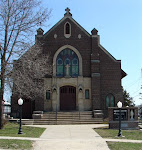Friday, November 20, 2009
Worth noting
Lest the occasion go unremarked, today is the 62nd anniversary of the promulgation of Pope Pius XII's encyclical Mediator Dei (20 November 1947), widely regarded as the magna carta of the 20th-century Liturgical Movement. Probably most NLM readers are familiar with this encyclical principally for its admonition against romantic antiquarianism, which took for granted (among other things) the versum populum posture of the priest-celebrant in the Early Church. In article 62, the Pope states:
Assuredly it is a wise and most laudable thing to return in spirit and affection to the sources of the Sacred Liturgy. For research in this field of study, by tracing it back to its origins, contributes valuable assistance towards a more thorough and careful investigation of the significance of feast-days, and of the meaning of the texts and sacred ceremonies employed on their occasion. But it is never wise nor laudable to reduce everything to antiquity by every possible...
For the rest of the article click here
A Parish Without Gregorian Chant is a Tragedy: Dan Schutte
An interesting interview with Dan Schutte:
Click here for the rest of the article
Friday, November 20, 2009
How Should Catholics Market Catholicism?
Some thirty years ago, evangelical Christianity threw itself heavily into the business of marketing itself with a series of hip slogans such as "I Found It" (a stranger is supposed to ask what this means, thereby opening an opportunity to share the Gospel). Along the same lines, there was the Good News Bible with a newspaper-theme cover. More recently there has been the WWJD campaign. Dozens of other kitschy campaigns have come and gone.Part this new sensibility, even a core part, was the cultivation of a specific youth sector within the church. The idea is born of the baby boom: there is some kind of generation gap that makes it difficult for young people to comprehend things in the same way that older people do. Thus must we concoct special sales pitches to show the youth that Christianity is for them. Of course we need youth ministers too (an aging guy who wears jeans) and a host of programs to show off that Christianity is not just for stodgy fuddy-duddies.
This effort almost always means adapting the shape and form of existing secular youth culture -- which itself is a modern invention -- and baptizing it with Christian themes and messages. The rationale is that if we do not create a Christianized copy of the prevailing youth culture, we risk losing the youth entirely.
If the kids are going to attend rock concerts, better that they be Christian rock concerts. If they are going to go to rallies and parties and scream their heads off about crazy stuff, better that they be Christian rallies, parties, and scream fests. Better to get high on Jesus than methamphetamines. That's the rationale.
The "youth retreat" was born at some point in this process, and by "retreat," I don't mean a time of quiet contemplation, spiritual reflection, and careful discernment. The retreat almost always involves the display of a series of would-be teen idols who sing and speak and tell jokes, and eventually get around to presenting an emotional story of their own conversion. These eventually morphed into huge national conventions with massive commercial sectors within them, with teens encouraged by parents to travel hundreds of miles to experience the spiritual high that comes with huge religious gatherings.
The heady mixture of presence of Christian rock-stars, encountered in the context of a thorough mixing of boys and girls on out-of-town trips, can lead to strikingly emotional experiences. Kids return telling of their new-found commitment to religion and also of the intense new friendships they have developed with others on the trip. Parents feel a sense of relief that at least these kids are hanging around with other Christian kids and not fraternizing with the seedy sectors of life.
Catholics were late to this approach to "selling" their faith to the youth but with Mass attendance dramatically down from decades ago, more and more people are getting in on the act. In the digital age, this involves heavy use of film and video shorts that promote bacchanalian scenes of fun, laughter, loud music, and inspiration of some sort or another.
And it does all make difference. The kids return home with a new countenance, and a new love of God and a new love of their neighbor, though the young can be rather confused about how to sort it all out.
They report on their changed lives. And this effect lasts for about six months on average, at least that's my strong impression. In its wake follows some degree of disillusionment, failed romances, and the status quo ante.
In the worst case, the effects of an event like this can actually backfire. By comparison to the massive youth rallies, the home parish seems rather staid and dull. Where are the rock bands, the great speakers, the beautiful boys and girls aching for new relationships, the inspiration that the rally dump on us by the buckets? Clearly there is nothing in my hometown parish that can compare to that.
The eye begins to wander to other sects that can provide or at least attempt to provide that unrelenting stimulation that comes with youth rallies. They do a much better job of it than Catholics. It may not last there either and it might be just as superficial but at least they make a go of it. On this front, the Catholics can't compete. And if the basis of your spirituality is the longing for media stimulation and artificially inflated spiritual highs, Catholicism is going to be marginalized at some point in their quest.
For Catholics, this is a very serious matter. ...
Click here to read the rest of the article.




